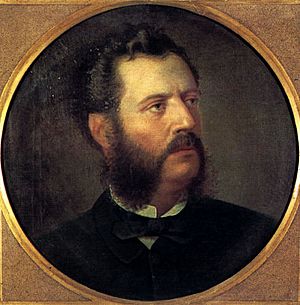Aristotelis Valaoritis facts for kids
Quick facts for kids
Aristotelis Valaoritis
|
|
|---|---|

Portrait of Aristotelis Valaoritis by Spyridon Prosalentis.
|
|
| Born | 1824 Lefkada, United States of the Ionian Islands |
| Died | 1879 Lefkada, Kingdom of Greece |
| Occupation | Poet, Politician, civil servant |
Aristotelis Valaoritis (Greek: Αριστοτέλης Βαλαωρίτης; 1824–1879) was a famous Greek poet and politician. He was part of a group of writers known as the Heptanese School, who came from the Ionian Islands. He was also the great-grandfather of Nanos Valaoritis, another well-known Greek writer.
Contents
About Aristotelis Valaoritis
Aristotelis Valaoritis was born in Lefkada in 1824. His family had roots in the Aromanian community, and his father was a wealthy merchant.
He went to school in Lefkada and Corfu. Later, he traveled to France and Italy to study law. However, he never became a lawyer. Instead, he decided to focus all his energy on writing poetry. He spent a lot of his life on the small island of Madouri.
When he was 25, he married Eloisa, the daughter of a scholar from Venice named Emilio De Tipaldo. Valaoritis wrote many poems using simple language. These poems often told stories about the Greek War of Independence. Because of his powerful writing, he was seen as a national poet of Greece.
Some of his most important poems include Stichourgimata, Mnemosina, Kira Frosini, Athanasios Diakos, O Fotinos, and Astrapogiannos.
O Fotinos is a very famous poem, though it was never finished. It tells the story of the Voukentra revolution in 1357. This was a rebellion in Lefkada against the people who ruled the island from Venice (Italy) at the time. Valaoritis wrote this poem on his private island, Madouri.
His Political Life
Aristotelis Valaoritis also became involved in politics. He was a member of the Parliament for the United States of the Ionian Islands. In this role, he worked hard to protect the rights of the people living in the Ionian islands. He strongly supported the idea of these islands joining the Kingdom of Greece.
Once the Ionian Islands became part of Greece, he moved to Athens. There, he became a member of the Greek Parliament. His speeches were very powerful and poetic, making him a unique and skilled speaker. In his later years, he worked to help the region of Epirus become part of Greece. This goal was mostly achieved during the Balkan Wars.
Aristotelis Valaoritis passed away in Lefkada in 1879. He died because of heart failure.
His Writings
Aristotelis Valaoritis wrote many poems and collections of his work.
Poems
- I Kira Frosini (Η Κυρά Φροσύνη) (1859)
- Athanasios Diakos (Αθανάσιος Διάκος) (1867)
- Thanasis Bagias (Θανάσης Βάγιας) (1867)
- Astrapogiannos (Αστραπόγιαννος) (1867)
- O andrias tou aidimou Grigoriou tou E (Ο ανδριάς του αοιδίμου Γρηγορίου του Ε) (1872)
- O Fotinos (Ο Φωτεινός) (This poem was not finished and was published after he died in 1891)
Collections of Poems
- Stichourgimata (Στιχουργήματα) (1847)
- Mnemosina (Μνημόσυνα) (1857)
Other Works
These are other collections of his writings that were published:
- Poiemata (Ποιήματα) (1891)
- Erga (Εργα) (1893)
- Vios kai erga (Βίος και έργα) (1907)
- Poiemata anekdota (Ποιήματα ανέκδοτα) (1937)
- Ta Apanta (Τα Άπαντα) (1968)
Images for kids
See also
 In Spanish: Aristotelis Valaoritis para niños
In Spanish: Aristotelis Valaoritis para niños
 | Mary Eliza Mahoney |
 | Susie King Taylor |
 | Ida Gray |
 | Eliza Ann Grier |



